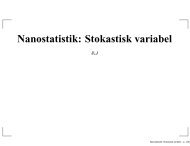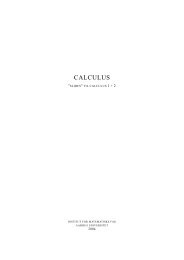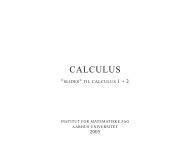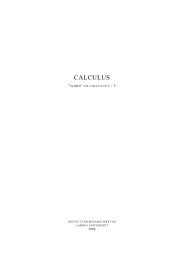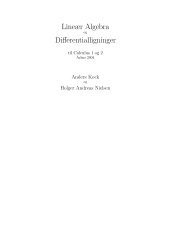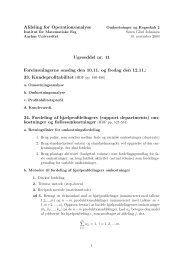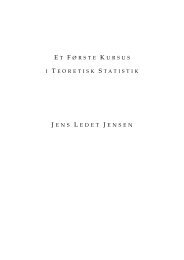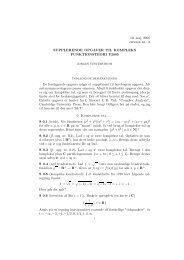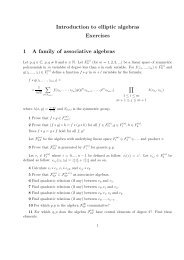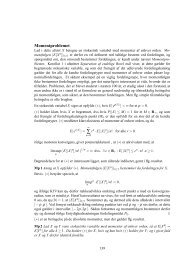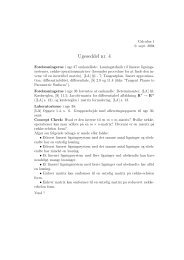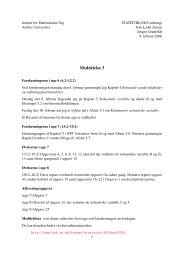Commutative algebra - Department of Mathematical Sciences - old ...
Commutative algebra - Department of Mathematical Sciences - old ...
Commutative algebra - Department of Mathematical Sciences - old ...
You also want an ePaper? Increase the reach of your titles
YUMPU automatically turns print PDFs into web optimized ePapers that Google loves.
10.3. DEDEKIND DOMAINS 113<br />
10.2.4. Corollary. Let (R, (p)) be a discrete valuation ring. Any nonzero element<br />
in the fraction field K <strong>of</strong> R has a unique representation up n where u is a unit and<br />
n ∈ Z.<br />
10.2.5. Definition. Let K be a field. A surjective map v : K\{0} → Z satisfying<br />
(1) v(xy) = v(x) + v(x).<br />
(2) If x + y = 0, v(x + y) ≥ min(v(x), v(y).<br />
is a valuation on K.<br />
10.2.6. Proposition. Let v be a valuation on a field K. Then<br />
R = {x|v(x) ≥ 0}<br />
is the discrete valuation ring <strong>of</strong> v. A local parameter is any element p, v(p) = 1.<br />
Pro<strong>of</strong>. Clear from the definition.<br />
10.2.7. Proposition. Let (R, (p)) be a discrete valuation ring with fraction field<br />
K. The map<br />
v : K\{0} → Z, up n ↦→ n<br />
is a valuation and R is the discrete valuation ring <strong>of</strong> v.<br />
Pro<strong>of</strong>. Clear from the definitions.<br />
10.2.8. Proposition. Let R, (p) be a discrete valuation ring. A finite module M<br />
has decomposition<br />
Where n1 ≥ · · · ≥ nk > 0.<br />
M = R/(p n1 ) ⊕ · · · ⊕ R/(p nk ) ⊕ R n<br />
Pro<strong>of</strong>. This is a case <strong>of</strong> 10.1.7 and 10.1.9.<br />
10.2.9. Exercise. (1) Let K be a field. Show that the subring K[[X 2 , X 3 ]] ⊂ K[[X]]<br />
is not a discrete valuation ring.<br />
10.3. Dedekind domains<br />
10.3.1. Definition. A noetherian domain R, which is not a field, is a Dedekind<br />
domain if all local rings RP at nonzero prime ideals are discrete valuation rings.<br />
10.3.2. Proposition. Let R be a Dedekind domain.<br />
(1) Any nonzero prime ideal is maximal.<br />
(2) If U ⊂ R is multiplicative, then U −1 R is a field or a Dedekind domain.<br />
Pro<strong>of</strong>. (1) (0), P are the only prime ideals in a prime ideal P . (2) This is clear<br />
from 5.2.11.<br />
10.3.3. Proposition. Let R be a domain which is not a field. The following conditions<br />
are equivalent.<br />
(1) R is a Dedekind domain.<br />
(2) Every nonzero proper ideal in R is a product <strong>of</strong> finitely many maximal ideals.<br />
Pro<strong>of</strong>. The primary ideals P (n) = P n . Conclusion by 9.5.4 and Chinese remainders<br />
1.4.2.<br />
10.3.4. Proposition. Let R be Dedekind domain.<br />
(1) If R is a unique factorization domain then it is a principal ideal domain.



